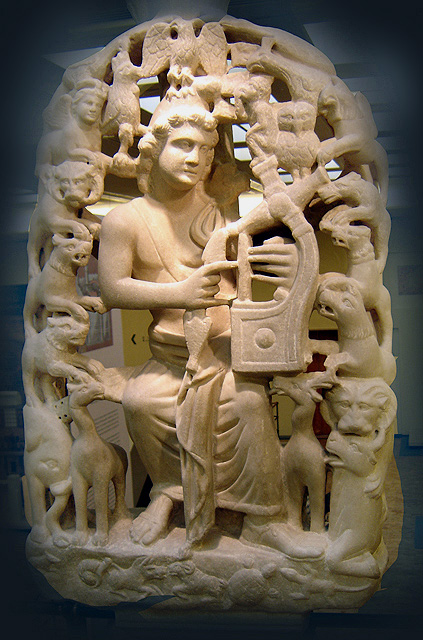 For a high school (‘Rhetoric’) class at the school where I teach, I’m putting together a master list and a series of blog posts with some comments about different periods in the history of Western Classical music; I plan to have these postings span over about three months and be finished by December of this year.
For a high school (‘Rhetoric’) class at the school where I teach, I’m putting together a master list and a series of blog posts with some comments about different periods in the history of Western Classical music; I plan to have these postings span over about three months and be finished by December of this year.
This should be handy for my students to use, but for anyone else who reads my posts I hope this can have some value as well! I plan to be brief and helpful in my points. (Especially this one, since I’ve not studied it all that much!)
So… What was Greek music really like? Well, very little was written down in a way that helps us moderns to know, but there are fragments of ideas here and there.
Since they didn’t have the complex chromatic instruments we have today, they made their music more interesting by using different modes --- in other words, each of the scale steps became a starting point for its own mode. (A mode is simply a scale, like ‘do-re-mi’ etc., but each of the modes runs up the scale notes from, say, ‘do’ to ‘do’ or ‘mi’ to ‘mi’ or ‘la’ to ‘la’ to get a different effect.
We have a series of modes that have been used from the Middle Ages to now, and they have ancient Greek names. Cool! But… the historians tell us that these unfortunately are merely based on Greek names because they were devised during a time of revival of interest in the ancient world --- so, drat, Lydian mode for us isn’t the same set of notes as Lydian mode two and a half thousand years ago.
So does that mean that they had the same diatonic scale we have? Well, sort of, I think, from the bits that I’ve read, but they didn’t think of it quite the same as we do. For example, 1) they went down the scale as the norm, rather than up the scale as we do. Also, 2) they thought of the scale as only four notes rather than eight (an octave), but they did combine two series of four to get eight, so it was fairly close to our octave anyway. Just downward, and in fours.
One last item: Notable writers had things to say about music. For example, Plato in his Republic discussed the varied kinds of emotional impact the different modes had on listeners, thus assuming that a musician could craft music in ways that he or she could predict would have certain objectives for the audience’s sake. We do that too nowadays, right? We may choose a minor key to give a sense of seriousness or sadness, for example.
But in ancient times they were really earnest about such things, because, among other things, they saw music as part of a mathematical system that had specific and organic meaning in the universe, thus making it more important to compose and play in a certain way so you were properly fitting your music into the fabric of essential truth. (I think I have that idea somewhat right --- but wow!)
Modern recordings of attempts at doing ancient Greek music are out there, and I have a few links here if you want to have a listen. However, bear in mind that these are improvisations based on ideas the performers have about how an ancient Greek piece might sound.
The instruments include the lyra, kithara, phorminx, krotala, aulos, diaulos, piktis, tympanon, pandouris, plagiaulos, salpinx, syrinx, etc. Recognize any instrument names here?
The Ensemble de Organographia playing syrinx, etc.
Sappho's Wedding Hymn (Epithalamion)
Michael Levy in a video playing the kithara
Conrad Steinmann playing two aulos




Comments